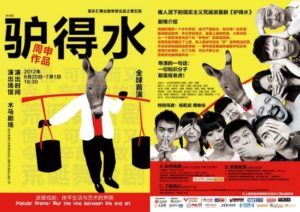Mr. Donkey
驴得水
China, 2016, colour, 2.35:1, 110 mins.
Directors: Zhou Shen 周申, Liu Lu 刘露.
Rating: 8/10.
Based on a play, this absurdist period comedy on human greed is a delight in both writing and acting.
A high, arid rural region in northern China, Jun 1942. Funded by a charity, a group of four big-city teachers, led by Sun Henghai (Da Li), has started the Three Principles Primary School in a former temple as a “rural education experiment” to improve the lot of country folk. The teachers are a mixed bunch: the always jolly Zhang Yiman (Ren Suxi), who has very liberated views, especially about sex; Pei Kuishan (Pei Kuishan), who has secretly fancied her for a long time but is mocked for his chronic bowel disorder; and Zhou Tienan (Liu Shuailiang), a hot-tempered but upright northeasterner who is friends with Sun Henghai’s 15-year-old daughter, Sun Jia (Bu Guanjin). However, not only are they having trouble attracting pupils but also, because the money from the charity is not enough to pay for a water donkey 驴得水, they’ve invented a fictional fifth teacher with a similar-sounding name, Lv Deshui 吕得水, and are using his wages to fund it. While the four are having yet another meeting to discuss planning, the donkey barn catches fire; but when Sun Jia eventually arrives with the water donkey, the teachers let the barn burn to save money. That evening a telegram arrives from the Education Ministry that a special commissioner is coming to inspect the school; in fact, he is due the next day, as the telegram has taken so long to arrive. As the the telegram also mentions five teachers, the four hurriedly disguise the local coppersmith (A Ru’na) as English teacher Lv Deshui, hoping the commissioner won’t understand the language. When Li (Han Yanbo), the commissioner, arrives, Sun Henghai sneaks a look in his briefcase and finds his purpose is to investigate Lv Deshui. Panicking, Sun Henghai instructs the coppersmith to pretend he’s lost his voice. The bluff appears to work, but Li then reveals that a US philanthropist, Mr. Ross (Arthur McLarty), has been looking to invest in an outstanding grass-roots teacher and Lv Deshui was considered the only suitable candidate. The bursary is worth 30,000 fabi a month. The four are speechless, and keep the news from the coppersmith. When he superstitiously refuses to pose for a picture ordered by the commissioner, Zhang Yiman sleeps with him to change his mind. Next day, the commissioner leaves, and all seems well. Two months later, the school has been renovated and everyone has a new wardrobe. But then another telegram arrives that the commissioner is on his way with Ross; and at the same time the coppersmith’s wife (Wang Kun) turns up to find out who’s turned her husband’s head.
REVIEW
In Chinese rural comedies it’s usually crafty locals who cheat outsiders, but in Mr. Donkey 驴得水 some teachers from the big city quietly conspire to cheat the authorities when they open a primary school in the sticks. An absurdist period comedy which turns rather black in its later stages, this first feature by theatre writing partners Zhou Shen 周申 and Liu Lu 刘露 is very likeable, is winningly played by the original key cast, and only runs out of some steam in its last 15 minutes. Satires of this kind, without any big screen stars, usually fall under the heading “arty” and don’t make much impact at the Mainland box office; but Donkey managed a more than respectable RMB173 million, seemingly by word of mouth.
 The screenplay is based on Zhou and Liu’s play The Donkey 驴得水 (see poster, left), which was originally written in 2010 as a film script by Zhou but, after an online short used the title and some of the content, was then reworked with Liu’s help into a play, to more rapidly secure copyright by being publicly performed. In Jun 2012 the play was successfully premiered in Beijing by JoyWay Drama 至乐汇舞台剧, and was then turned back into a script when Zhou heard that theatre company Mahua FunAge 开心麻花 was looking for a second film project after the comedy Goodbye Mr. Loser 夏洛特烦恼, which grossed a huge RMB1.4 billion on release in autumn 2015.
The screenplay is based on Zhou and Liu’s play The Donkey 驴得水 (see poster, left), which was originally written in 2010 as a film script by Zhou but, after an online short used the title and some of the content, was then reworked with Liu’s help into a play, to more rapidly secure copyright by being publicly performed. In Jun 2012 the play was successfully premiered in Beijing by JoyWay Drama 至乐汇舞台剧, and was then turned back into a script when Zhou heard that theatre company Mahua FunAge 开心麻花 was looking for a second film project after the comedy Goodbye Mr. Loser 夏洛特烦恼, which grossed a huge RMB1.4 billion on release in autumn 2015.
Set during WW2 in a high, arid region of northern China, the story opens a year or so after four urban teachers have set up a primary school in the middle of nowhere under a charity-funded “rural education experiment”. The locals, however, aren’t very enthused: the school only managed six pupils last year and the coming year looks to be even harder. And the four do-gooders aren’t especially principled: they’ve invented a fictional fifth teacher whose salary they’re using to pay for the donkey who brings their water. When a special commissioner suddenly arrives to check on the school, the four panic and disguise a local bumpkin as the fifth teacher. Initially it looks as if they get away with the charade; but during a subsequent panic, personal strains threaten to tear the group apart.
The dialogue and chemistry between the cast in the first 50 minutes is a delight to hear and see: from the quality of the writing and the use of limited locations (mainly the school premises), it’s clear the film is based on a play, but it doesn’t matter in the slightest, given the actors’ ease with their roles and each other, honed on the stage. The invisible direction emphasises a real rural setting – water-starved, high altitude, backward – and keeps the performances within limits: these are big characters but not theatrical ones. (In this respect, the film’s poster misrepresents the acting tone.) And for all their supposed high-mindedness, the teachers still bitch about money and salaries, while the sole female teacher is more interested in her new qipao than a meeting on pupil recruitment.
Though TV veteran Da Li 大力 is top billed, and it’s invidious to single out individual performances in such an ensemble, theatre actress Ren Suxi 任素汐, 28, carries the first half, as a perpetually jolly, off-handedly emancipated character who has no qualms about bedding a local to keep a scam on track. It’s a deceptively elegant performance by the Shandong-born actress as a woman who’s always in control but in a low-key way; when the tables are turned in the second half – not only on her but on the whole group – it’s a powerful moment that’s later thrown away by then sidelining the character. That weakness apart, and a final funeral that’s just one charade too many when the end is in sight, the script, which hews closely to the play, sustains itself remarkably, with fresh twists and turns on the central joke, and all the characters getting key moments (even the bumpkin’s wife, who only appears in the second half).
Among the men, Han Yanbo 韩彦博 stands out as the commissioner, a glassy-eyed KMT official who can out-scam any scammer (or, in bureaucrat-speak, “optimally distribute in a fair manner” 合理优化的分配), while A Ru’na 阿如那 is very good as the beatific local bumpkin whose heart is broken but turns out to be cleverer than he looks. Though it’s set in 1942, the war is something distant and only implied, and politics are largely ignored: the KMT government, represented by the commissioner, is shown to be corrupt and in the pockets of the US, but the teachers aren’t much better, despite the headmaster’s son having run away and joined the Communists. (A final title notes, distractingly, that one character later ran away to join him.) However, despite these political flecks, Donkey works as a satire on human weakness and greed – the same qualities that the teachers were sent to erase in the peasantry. And it does so in a thoroughly entertaining way.
Technical credits are modest but immaculate, with limited use of Shanxi locations and most of the action set inside the school building, itself based in a disused temple to the Rain God. Widescreen work by Taiwan d.p. Lin Liangzhong 林良忠 [Jong Lin] (Eat Drink Man Woman 饮食男女, 1994; The Road 芳香之旅, 2006) is typically clean and bright, and art direction and costume design both look less laundered than in, say, the recent Mr. No Problem 不成问题的问题 (2016), set in the countryside at the same time. The film’s title literally means “Donkey Brings Water”, with the last two characters (déshuĭ) also the name of the animal; the name chosen for the fake fifth teacher is Lv Deshui 吕得水, with the first character (a regular family name) sounding very close to that for “donkey” 驴.
CREDITS
Presented by Beijing Sili Media (CN), Beijing FunAge Pictures (CN), Tianjin Maoyan Media (CN), Beijing In Entertainment (CN). Produced by Beijing Sili Media (CN)
Script: Zhou Shen, Liu Lu. Play: Zhou Shen, Liu Lu. Photography: Lin Liangzhong [Jong Lin]. Editing: Zhou Shen, Yang Yang, Li Quanyang. Editing advice: Liao Qingsong. Music: Liu Zhou. Songs: Fan Chong. Art direction: Li Chuanyong. Costume design: Song Qiao. Sound: Zhang Wenjuan, Xu Ying. Acting direction: Jin Ye. Executive direction: Guo Yiwei.
Cast: Da Li (Sun Henghai, headmaster), Ren Suxi (Zhang Yiman), Pei Kuishan (Pei Kuishan), Liu Shuailiang (Zhou Tienan), A Ru’na (coppersmith), Han Yanbo (Li, special commissioner), Bu Guanjin (Sun Jia, Sun Henghai’s daughter), Wang Kun (coppersmith’s wife), Gao Yang (Li’s secretary), Arthur McLarty (Mr. Ross), Liu Haoliang (Li’s driver), Zhou Shen (photographer), Su Qianyue (sergeant), Geng Jiancai, Hua Jie (policemen), Wang Feng (Ross’ doctor).
Release: China, 28 Oct 2016.
